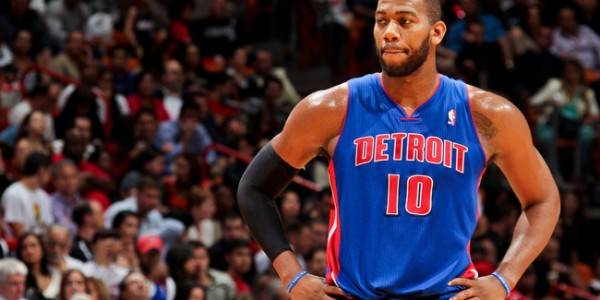
The Detroit Pistons and Greg Monroe have been unable to agree on a new long term contract through this off-season, and so it seems that Monroe will sign the qualifying offer, keeping him on the team for one more season but make him an unrestricted free agent next summer.
Monroe, a restricted free agent, didn’t get any offer sheets coming his way to pressure the Pistons into giving Monroe the kind of money he wants, which was about $15 million a season and slightly more; in short, a max deal. They were offering him about $12 million a season, maybe hoping that someone that come up with an offer that makes him walk because they seem to have an overcrowded situation in their frontcourt, having a hard time deciding between him and Josh Smith.
The qualifying offer means Monroe will be signed for $5.3 million, and lose about $7 million next season. It won’t matter if the next deal he signs, with the Pistons or anyone else, will be big enough to make up for that, which means a four-year deal worth at least $14 million a season. Monroe is a capable power forward and might be one of the best players in the NBA in terms of moves near the basket, but his defense and lack of range worries general managers to the point where they don’t see him fitting into the mold of a franchise building block.
His numbers are fine: Monroe averaged 15.2 points and 9.3 rebounds per game last season. He hasn’t had any injuries in his four NBA seasons, missing only three games in total. However, the Pistons haven’t seen a huge development from him from his third year to his fourth. Maybe it had something to do with their bad decision to sign Josh Smith, but it might simply mean that Monroe has already peaked as a basketball player, despite being only 24.
Monroe is in a similar situation compared with Eric Bledsoe, who is an RFA in something of a jam with the Phoenix Suns. Bledsoe has also been asking for the max contract, and hasn’t been getting it, which means signing for a qualifying offer, although a reduced one compared to Monroe. Bledsoe is less likely to find a team willing to give him such a big contract on his next deal that it’ll make up for the money he loses next season.
There is no right and wrong, bad or good in this business. This is negotiation. But looking at it from the outside, like with the Bledsoe case, it seems like someone has been feeding Monroe pieces of bad advice, making him think he’s much better and valuable than he actually is.
